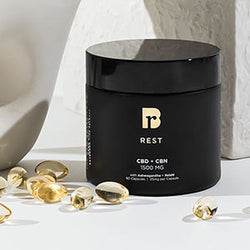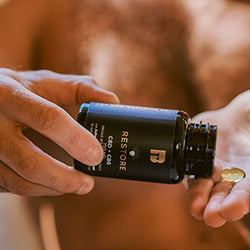If you're seeking a simple method to boost your immune health, taking Vitamin D is a no-brainer!
Around 40% of American adults are deficient in Vitamin D.
The key reason behind these soaring numbers is the negligence of the proper intake of immune system booster vitamins. People still aren't aware of the significance that VItamin D holds in our body. If you are also one of them, this blog is for you.
Here, we'll discuss the various benefits of Vitamin D and understand how you can choose the right Vitamin D softgel supplements to keep your immune system healthy!
Understanding Vitamin D
Let's discuss Vitamin D – the 'sunshine vitamin.' You must have heard it at least a thousand times, but do you really know the reason behind Vitamin D's importance? If not, read on as we break down the significance of Vitamin D –
Where Do You Get Vitamin D?
- The Sun: The surest way to get Vitamin D is by getting it from the sunlight. When the skin is exposed to UVB rays, it begins to synthesize Vitamin D naturally. Pretty impressive, no? However, too much sun without protection is not suitable for the skin; hence, make sure you are not burning yourself out.
- Foods with Vitamin D: In case you can't have sufficient exposure to the sun, there is no cause for alarm; your diet will take care of that. Oily fish such as salmon, mackerel, and sardines serve as a great source of vitamin D. Moreover, some of these nutrients can be found in fortified products like milk, cereals, or even orange juice.
- Supplements to the Rescue: Finally, supplements are beneficial for getting vitamin D. There are lots of them, such as capsules, liquids, etc. Great for people who live in places where one rarely meets the sun or for those who are physically inactive.
Importance of Vitamin D: Why Should You Care?
Vitamin D is not just another vitamin; it serves some essential functions to keep you healthy. It facilitates calcium and phosphorus absorption in the body, promoting bone strength and protection against diseases such as osteoporosis. However, that is not the only function it serves – it is also important for the functioning of the immune system, maintaining muscles, and even managing insulin sensitivity (which is essential for the control of blood sugar).
Fun fact: Vitamin D is also considered a critical vitamin for building the immune system. Vitamin D aids in the fight against diseases, ensuring that the immune cells perform their functions. Low levels of Vitamin D in the body may also account for the high frequency of colds and respiratory infections experienced by some people, as well as other illnesses like autoimmune diseases.
Benefits of Vitamin D for Immune Health
Still not convinced about all the crucial functions that Vitamin D performs? Let us get to the key benefits of Vitamin D for our immune health –
How Vitamin D Regulates Immune Cells
Immune cells such as T cells and B cells or macrophages have receptors for Vitamin D. These receptors regulate vitamin D activity – imagine a coach who directs the players at all times; this is how vitamin D acts as a coach. It assists in regulating proteins and cytokines that keep the system in a working balance and manage its activity. Thus, the immune system knows when it should be aggressively active and when it should not be. All in all, preventing excessive or insufficient inflammatory responses.
Reducing Inflammation & Stopping Chronic Diseases in Their Tracks
The immune system creates inflammation as a mechanism of defense. However, the persistence of that inflammation causes more harm than good. It increases the risk of developing health conditions such as cardiovascular diseases, diabetes mellitus, and cancers.
But the good part? Thanks to the presence of Vitamin D, some anti-inflammatory properties help in reducing unwanted inflammation. And with less inflammation, the risk of being affected by those chronic diseases is also reduced. Who knew sunshine could save lives?
Vitamin D and Autoimmune Diseases – Is There a Link?
An autoimmune disease occurs when the body mistakenly attacks its healthy tissues due to a misrepresentation of the immune system. Some studies say that these illnesses may be related to or even caused by a deficiency of this immunity booster vitamin. This includes conditions such as rheumatoid arthritis, multiple sclerosis or diabetes type 1.
Although there’s no complete study yet, one measure of preventing autoimmune problems could be maintaining Vitamin D levels.
Choosing the Right Vitamin D Softgel Supplement
Now that you are convinced about the importance of Vitamin D, how about adding a Vitamin D softgel supplement to your routine? But wait, there are a number of options in the market; how do you know which one's the best for you? Let's understand –
D2 vs. D3: What's the Difference?
Looking for Vitamin D, you will find two forms of it printed on the packager: D2(ergocalciferol) and D3(cholecalciferol).
Vitamin D2 comes from plants and yeast, while Vitamin D3 is derived from animal sources. Although they have slightly different molecular structures, Vitamin D3 is considered more effective as compared to D2 in increasing Vitamin D levels in the body. Moreover, D3 is more bioavailable, which means that its absorption and efficacy in the body are better. So, the next time you go shopping, look for a supplement that contains Vitamin D3, as it will give you excellent value for your money.
Finding the Right Dosage
Vitamin D intake varies a lot depending on various elements such as age, dietary habits and exposure to sunlight, among others. It is always safe to seek medical advice in order to assess the right amounts. Healthcare experts may usually refer to dosages in micrograms (mcg) or units of international measure (IU). Note that excess consumption is not recommended. More isn't always better when it comes to vitamins — the body must only take in what it requires.
Tips for Picking a Quality Softgel Supplement: How Do You Identify the Best Options?
- Go with a trusted brand: It is best to purchase from a brand that is reputable in quality. No compromise in this one!
- Check for certifications: Certifications such as the USP or NSF prove that the supplement is of reasonable quality.
- Watch out for extra ingredients: Some softgels include filling extras like calcium or magnesium for absorption purposes. Just make sure there are no added ingredients that your body doesn't need.
- Stick to the recommended dose: Vitamin D is indeed great, but overdose can be excessive. Always stick to the prescribed limits or seek the medical expert's opinion.
- Read the label: It seems obvious, but ensure you pay attention to what is contained in that about a softgel, whether it has an allergen or when it expires.
Adding Vitamin D Softgels to Your Daily Routine
Taking Vitamin D softgels into one's diet is a quick way to increase Vitamin D levels in the body. Here's how to make them part of your daily routine:
- Pick a time that works for you: Select a time that works well for you, like breakfast in the morning or lunch at midday. Consistency is paramount, especially in this case, and the capsule should be ingested with food for better absorption!
- Pair with other nutrients: Vitamin D gets along with various nutrients such as calcium and magnesium, to name a few. You might wish to take VItamin D with such supplements for even better results.
- Watch for side effects: In some rare cases, some people will experience some discomfort (such as nausea and constipation). In such a case, stop the intake and consult your physician.
- Consult your healthcare provider: Especially if you are on other medications, have certain health conditions or want to initiate the use of a new supplement, get professional recommendations first in order to determine the correct dose.
Conclusion
There is no denying that Vitamin D does wonders when it comes to supporting one's immune health. It helps maintain the balance of the immune system while controlling excessive levels of inflammation. Also, taking Vitamin D softgels is highly convenient and effective - take one each day! If you don't like softgels, Vitamin D tinctures are another excellent option for your routine.
Just remember to consult your doctor first regarding the appropriate immune support vitamins for you.







